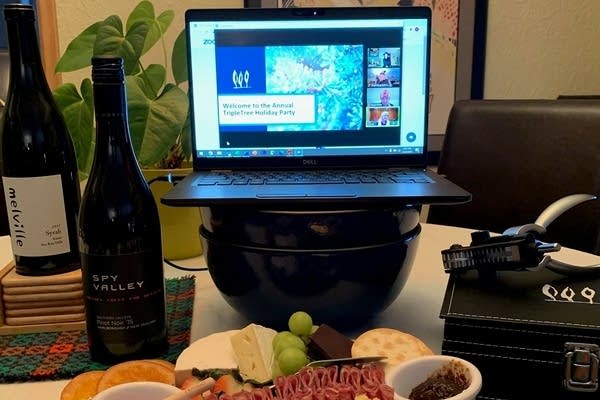Omicron continues pain for event businesses in MN, still not back to normal

Go Deeper.
Create an account or log in to save stories.
Like this?
Thanks for liking this story! We have added it to a list of your favorite stories.
Wendy Porter has a vivid memory of how the COVID-19 pandemic first affected her event business. The Minneapolis-based event planner was in San Francisco, putting the final touches on a corporate event in March 2020.
They watched worriedly all week as measures to contain the coronavirus started overseas, then reached the U.S.
It marked a gigantic change for Porter who has been in the business for 20 years and owned her company, Wendy Porter Events, for six years.
“From that point forward, you know, all live events, at least for the year, were canceled. I spent many, many months supporting clients, basically unraveling events," said Porter.
Turn Up Your Support
MPR News helps you turn down the noise and build shared understanding. Turn up your support for this public resource and keep trusted journalism accessible to all.
Porter reschedules, then often cancels events, as the pandemic wears on. She spends many hours working on events that never happen.
COVID illnesses have killed nearly 11,700 Minnesotans, led to government restrictions as well as a hesitancy among people to go to large gatherings.
There are more than a million businesses nationwide that derive income from the kind of events Porter organizes — companies that handle lighting, music, catering, design and planning.
Many lost once-stable work.
The Live Events Coalition trade group says that 78 percent of workers in the live events industry were furloughed and 12 percent of businesses folded since the pandemic began.
"That's part of our challenge is that we've intentionally been behind the scenes. So nobody really knew how big this industry was. And that was somewhat by design, and now it's really hurting us," Porter said.
Porter said other industries, like independent venues and restaurants, have received targeted funding that live event companies have not.
David Greer runs Porchlight Productions, an Excelsior, Minn.-based company behind the annual Lake Home & Cabin Show. This month’s show, which was supposed to be at the Minneapolis Convention Center, was canceled. He said pandemic-related cancellations hurt him, his employees and dozens of other small companies that work these events.
He described his situation to U.S. Rep. Dean Phillips and U.S. Sen. Amy Klobuchar in a recent virtual meeting, and asked for federal aid, targeted at the live events industry, that “will buy us the time to dig out of this 22-month revenue hole and to begin our recovery.”
In Rochester, Minn., Brandon Helgeson’s Big Bang Companies puts on 5K races nationwide. Helgeson saw his business evaporate in the pandemic with 149 of 150 scheduled events canceled in 2020.
He tried to fill in the gaps and to keep employees on by hosting virtual events, drive-in concerts, virtual happy hours. He even hosted an online game show from his basement.
After a 90 percent revenue drop in 2020 and 50 percent in 2021, Helgeson takes on anything and everything he can to keep the business busy.
“I was saying ‘yes’ to everything I could say yes to and, you know, thankfully most of my staff stuck with me because there were times where I was probably asking a bit much of them,” he said. “But I also didn't know when the next paycheck was coming.”
He’s stressed about his employees, about the future of his lifelong career in events, his retirement now pushed back at least seven years, and his family.
“It definitely took a toll, you know, on multiple different levels, not just the financial, but definitely the mental and the physical.”
Helgeson hopes for help from the government and that things will open back up soon. But so far this year, he has seen a 30 percent cancellation rate due to the omicron surge.



